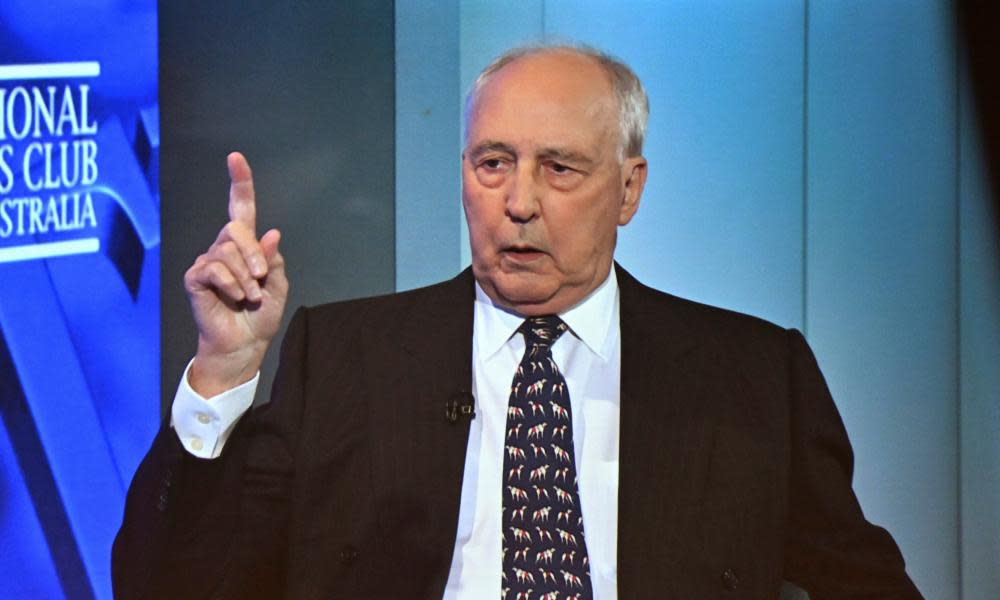How many ex-PMs does it take to sink Australia’s nuclear submarine deal?

How many former prime ministers does it take to sink eight nuclear submarines?
Malcolm Turnbull was quick to share his concerns about the $368bn Aukus submarine purchase announced this week after 18 months of planning, but the opposition to Aukus was led by that Labor war horse: Paul Keating.
And spectators of politics were treated to the best and worst of Keating at the National Press Club on Wednesday.
Keating was at his weakest when defending China, deflecting questions about its human rights record by arguing mistreatment of Uyghurs is “disputed”.
Related: Paul Keating has ‘diminished’ himself with scathing attack on Aukus submarine deal, Albanese says
Challenged on how he could claim China is no threat to Australia, Keating responded “because I’ve got a brain”, labelling the question “dumb” and focusing only on the remote possibility of a land invasion.
Trade sanctions are “not a threat” and cyber-attacks were also brushed aside because Russia and the US do them too.
Yet amid all the free character assessments dished out, it was Keating’s reading of the internal dynamics of Labor that were the most perceptive.
Keating assessed that in September 2021, when Scott Morrison sought Labor support for Aukus and nuclear submarines, Penny Wong was determined to prevent a “khaki election” and run the “smallest small-target strategy” by agreeing with the Liberals.
Anthony Albanese actually got out ahead of this criticism, noting in February in our political editor Katharine Murphy’s politics podcast that he would have pursued the Aukus alliance anyway because defence officials would have supplied the same advice.
Keating took aim at Albanese for saying elsewhere that he was “very proud” to have provided bipartisan support for Aukus within 24 hours.
The only way you could make such a decision – with its huge cost and implications for international relations – is “if you have no perceptive ability to understand the weight of the decisions you’re being asked to make”, Keating said. “It’s what other people call incompetence.”
The defence minister, Richard Marles, countered in conversation with my colleague Daniel Hurst that the party didn’t decide “from scratch”, he was already “deeply immersed” since 2016 in the strategic thinking about submarine capability.
Still, Keating said that Albanese had “no mandate” to agree to Aukus, predicting that when Labor branch members cotton on “there will be a big reaction”.
If you were making a Frankenstein monster to scare Labor’s leftwing membership base, Aukus has some pretty alarming nuts and bolts: ever-closer alignment with the US, high level nuclear waste to be stored in Australia and hundreds of billions of defence spending.
But the announcement front-loaded the winners from the plan (jobs for South and Western Australia). The losers are back-loaded: a nuclear waste dump, whereabouts TBD; $3bn of mystery cuts elsewhere in defence TBA; and a barney over where to put the east coast base, which locals at Port Kembla oppose.
Few so far seem genuinely spooked by it.
The Maritime Union and shipbuilding unions, including the Australian Manufacturing Workers Union, wanted conventional submarines.
Doug Cameron, a former AMWU secretary and Labor left senator, and Peter Garrett, the former environment minister, both bagged Aukus.
One hard-left former union official and Labor staffer revealed on social media that his local branch had passed a resolution (before the announcement, incidentally) calling for a withdrawal from Aukus and abandonment of nuclear submarines – but whether that catches on is unclear.
For the parliamentary Labor party, it seems the imperative of continuing Albanese’s honeymoon run trumps everything.
That position may come under strain as parliament marks the 20th anniversary of the Iraq war invasion, a military decision which Labor rejected from opposition – a big call Keating says they got right and the sort of thing that might inspire more opposition to integration with the US system.
Labor MPs this week were remarkably united, locked in behind a policy that has been set for so long and well-briefed on the specifics of its price tag and why it is necessary. They say their phones haven’t blown up.
Josh Burns, the member for Macnamara in inner south Melbourne, said people respected what was a “serious policy” and an “important decision” for the country.
Graham Perrett, the member for Moreton in Brisbane, said “people are aware the world is very different, even from 2013.
“We know there is a changed set of circumstances – not just in Ukraine … we know that our local patch is different.”
Even the question of how to pay for Aukus didn’t spark a fight .
That was partly because the cost over four years is purportedly budget neutral and partly because the kite-flying exercise on reforming stage three tax cuts was already tried last year by the treasurer, Jim Chalmers. For now, it’s no official change.
That left the crossbench, particularly Senator David Pocock and the Jacqui Lambie Network, as the only ones joining the dots between the $368bn-over-30-year spending on Aukus and the $250bn over 10 on the stage-three tax cuts.
A dishonourable mention this week goes to Peter Dutton for his suggestion that bipartisan support for cuts to the national disability insurance scheme could pay for Aukus.
All the opposition leader needed to tell the ABC’s Sarah Ferguson was the Coalition would support appropriate savings but not Labor tax hikes.
Instead he singled out one vulnerable category of welfare recipient, doubling down the next day after the announcement rather than taking the opportunity to clean up.
Albanese got the line right on 3AW on Thursday: Aukus should be considered separately to measures to pay for it, because revenue and taxes are not reserved for a particular purpose.
All in all, the sell has started well for Albanese: so far the critics are few and familiar, and the federal party remains united behind an enormous undertaking.

 Yahoo News
Yahoo News 
